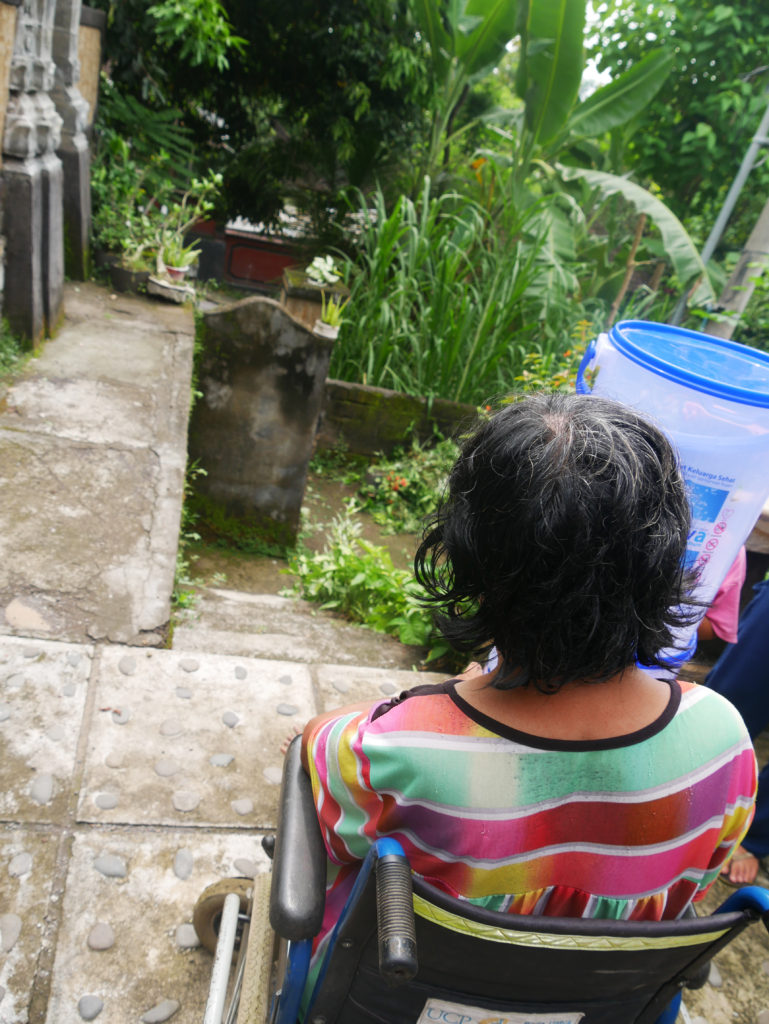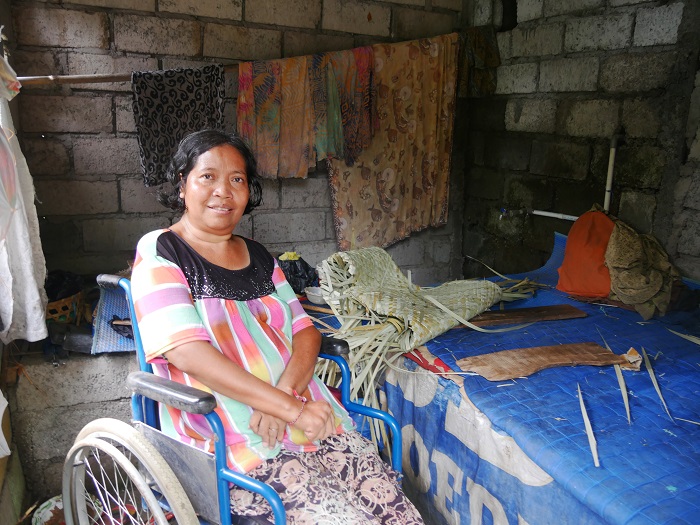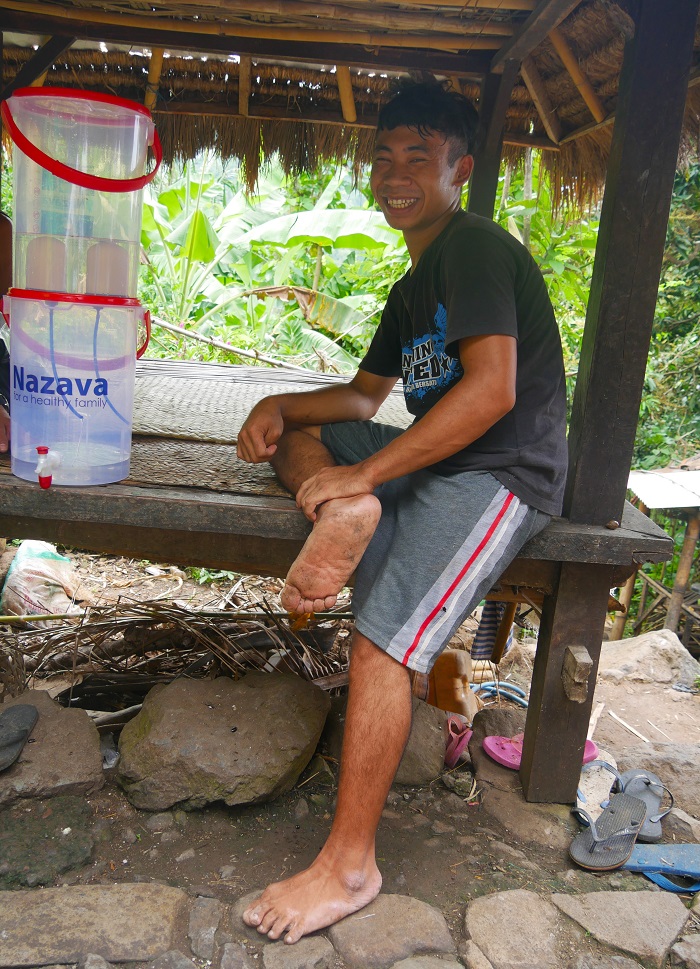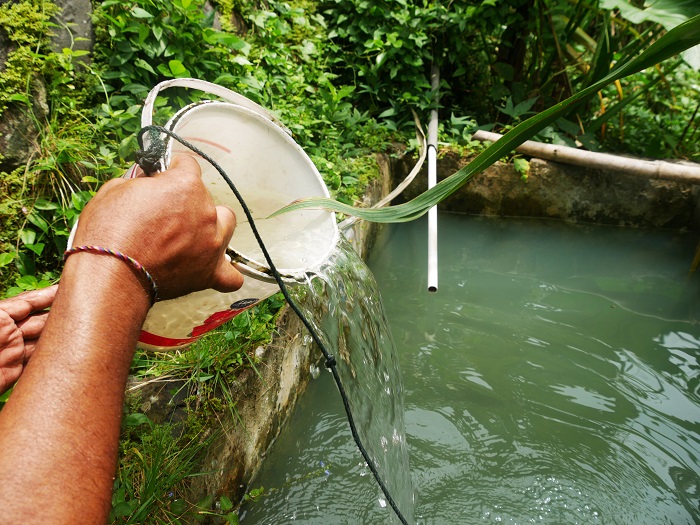
46-year-old Ni Ketut Kembar from Karangasem lives with a debilitating paralytic disease and is unable to access basic necessities, like water.
Paralysed from the waist down (which has now started to spread to her hands), Ketut Kembar finds it extremely challenging to move in her inaccessible traditional Balinese home.
There’s no bathroom in her bedroom, only one tap and a washbasin for her to wash. The small world she has known is through her small, cramped bedroom.
PUSPADI Bali staff gave Ketut Kembar a fitted wheelchair so she could move further than her bedroom, where she had lived (unable to move), for many years.
Our team will work with her and her family to improve accessibility at her home. Once Ketut Kembar became sick, her husband left her and remarried. Her only option then was to live with her sister and her family (her sister is expecting a baby).
To generate a small income, she produces and sells woven mat at the local market, receiving IDR10, 000 for each one (which is less than US$1.00).

For Ketut Kembar and other people with a disability, it is their basic right to access quality healthcare, jobs, education, and safe, clean, drinking water.
It’s why we’ve partnered again with Kopernik to deliver vital Nazava Bening 2 water filters to people like Ketut Kembar, and others with a disability, who are living in one of the poorest areas of Bali.
Thanks to funding from Kopernik and the Disability Initiative Grant (supported by the Australian Government), 50 people with a disability (living in some of the remotest areas of Bali), are receiving a filter.
Globally, at least 1.8 billion people use a drinking-water source contaminated with faeces. Furthermore, contaminated drinking-water is estimated to cause 502, 000 diarrhoeal deaths each year. In low- and middle-income countries, 38% of health care facilities lack improved water source, 19% do not have improved sanitation and 35% lack water and soap for handwashing (WHO).
It’s a UN Sustainable Development Goal that everyone has access to clean, accessible water – and yet many people are unable to, due to poor economics and infrastructure.
The Nazava Bening 2 water filters purifies water quickly with a filtration speed of six litres per hour.
As the water passes through the filter candle (made from ceramic and impregnated with silver and activated carbon), bacteria, viruses and parasites are eliminated, which removes the health risks related to consuming contaminated water.
Now Ketut Kembar and her family have their own filter, they’ll no longer have to drink boiled water (which her sister usually did three times a day). Nor will they have to drink unboiled water, which they drank once and became ill.
The filter has increased their accessibility to safe drinking water and potentially reduced health problems, saving them time and money.

I Kadek Sudana, Karangasem (husband and father of 2 children)

37-year-old I Kadek Sudana worked as a truck driver before his accident in December 2015. Sudana’s truck was broken so he parked it on a downward road to fix it (without a stopper). As a result, it ran over his legs and back, causing severe injury to his spine which has paralysed him from the waist down.
Due to the immense pain in his back, Kadek Sudana went into hospital for 19 days to have surgery but couldn’t due to a lack of surgeons. He then went home and had oral medication. A month later, a wound on Kadek Sudana’s back got infected and he went into hospital again to have surgery. He has been in pain since then and has only recently started to feel better.
After this experience, Kadek Sudana is unsure whether he’ll have further surgery to put a pin in his back or not. PUSPADI Bali has provided him with a wheelchair so he can be independent and have mobility. Fortunately, Kadek Sudana has the support of his wife and two children, a son and a daughter (who received a scholarship and is in the 9th grade).
When he was working as a truck driver, he could generate IDR100, 000 (USD $7.50) every day, but now his main source of income comes from raising and settling cattle, chicken and pigs. Kadek Sudana and his wife grow a local maize bean in the field at the back of their house, which can only be harvested once a year. They dry the maize-bean under the sun for five days to make popcorn. They also use the seeds from the bean for their next planting season.
Collecting water and boiling it ready for drinking is difficult and treacherous for Kadek Sudana and other people with a disability (using wheelchairs, prosthetics, orthotics or others living with mobility aids), who are living in remote areas. They often have to travel far to access a well, spring or river to collect water, Carrying it can be heavy. Boiling it on a stove can be especially difficult as it takes a lot of time and can use precious wood supplies. Improper practices related to purifying water to drink can also lead to health problems such as diarrhea and water-borne diseases.
Water from improved and accessible sources enables people to spend less time physically collecting it. It also reduces the need to take long or risky journeys to gather it. Until now, Kadek Sudana and his family paid to access water from a public tap (which was muddy and bad quality). For drinking, they travel to collect 40L of water from a mountain or spring water. Then Kadek Sudana’s wife would usually boil it on their gas cookstove, before they’d drink it.
Kadek Sudana and his family now have easy access to purified water from their own filter, given to them by PUSPADI Bali and Kopernik. It’ll boost their productivity and in turn, reduces poverty. They’re also able to save the little money they have by not spending it on water and can redirect it into other priority areas.

________________________________________________________________________________________________________________________________________________________________________________________________________________________________________
I Ketut Edi, Karangasem (lives with his parents and younger siblings)

Born with cerebral palsy, I Ketut Edi lives with his parents and younger siblings in a basic home in a remote, impoverished village in Karangasem. Ketut Edi’s house is surrounded by trees, his family’s livestock, and a small temple to make offerings to the Balinese Hindu Gods. His chores are raising cows, looking after the animals and growing maize for household consumption.
Accessing safe and readily available water is difficult, as Ketut Edi collects it from a nearby reservoir and boils it using a traditional fuelwood and three-stone cookstove. He boils (20L) every two days but it’s a time-consuming method and doesn’t remove all the impurities in the water, which is a health risk to him and his family. Once, Ketut Edi became sick when he drank unboiled water directly from the reservoir.
There’s a growing inequality between rural and urban areas of Bali where people living in remote, low-income areas have little access to quality drinking-water, and the problem is deepening rather than improving. Water quality is an issue across the island but moreso in isolated, impoverished pockets of Bali where people and those with a disability find it immensely challenging to source drinking water.
Now Ketut Edi has received a Nazava filter, he’ll no longer have to spend considerable time boiling water and can focus on his other daily tasks. The filter will also potentially prevent them from getting stomach aches and other waterborne diseases.

________________________________________________________________________________________________________________________________________________________________________________________________________________________________________
Ni Wayan Sariani and Ni Wayan Subrate, Karangasem (both have a disability and are raising three children)

Ni Wayan Sariani and his wife, Ni Wayan Subrate, are raising three children, including a daughter (17), a son (14) and a baby (7). Wayan Sariani has a clubfoot while his wife became disabled after a motorbike accident, many years ago. They live in an impoverished area of Karangasem where it’s very hard to find work to support them and their family.
The couple gather water from a pipe and boil it before drinking, but it’s bad quality and they’ve become sick from it. It’s extra hard for them to raise a family, find ways to sustain themselves and source good drinking water when they both have a disability and living in an isolated part of Bali.
Now they have a continuous source of safe, reliable water from their Nazava filter, they’re happy that they don’t have to spend long hours preparing for it to be safe to drink.
“Thanks so much for helping us…and we hope the water filter will function for us and our family,” Wayan Subrate said.
